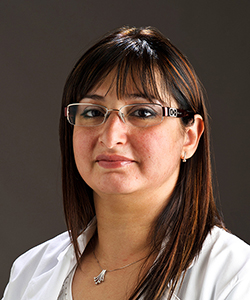May 29, 2025

Some days, your jeans zip with ease. Other times, you need to switch to yoga pants. Sure, there’s a chance you gained weight overnight — but more likely than not, it’s just bloating. You know, that “I’m-too-full, can’t-suck-in-my-gut-even-if-I-tried” feeling.
Rest assured that you aren’t the only one bummed out about bloating. In a survey of nearly 90,000 Americans, 14% reported feeling bloated at least once in the past week.

“Most people complain of bloating at some point in their lives, and it can show up in different ways,” says Dr. Khulood Ahmed, MU Health Care gastroenterologist (digestive health specialist). “Bloating can make your stomach feel tight with no obvious swelling. Other times you can see visible distension (expansion).”
Bloating can be uncomfortable and even painful. It can also cause unrelenting gas. The good news is that you can typically manage bloating with a few small lifestyle changes or simple treatments.
The first step is pinpointing the possible cause.
Common Causes of Bloating
During the digestive process, you create gas that is typically absorbed by the body or released by burping or flatulence. However, if a build-up of excess gas occurs, it can lead to bloating.
“By understanding the causes of bloating and making lifestyle or dietary adjustments, you can manage your symptoms effectively and improve your quality of life,” Dr. Ahmed says.
Common causes of bloating include:
1. Constipation
Constipation (not moving your bowels easily or regularly) is a sign your digestion is stalled or moving slowly. At least 2.5 million doctor visits every year in the United States are related to constipation. You may be constipated if you have fewer than three bowel movements a week or if your stool (poop) is hard, painful or difficult to pass.
“When stool moves too slowly through the colon, gas can build up and cause bloating,” Dr. Ahmed says. “Treating the constipation can take care of the bloating.”
Banish the Bloat:
- Exercise regularly: Physical activity gets the digestive system moving.
- Hydrate: Drinking water supports healthy digestion.
- Increase fiber: Fiber can help with constipation, but introduce high-fiber foods — such as whole grains, vegetables and nuts — slowly to avoid creating excess gas.
- Manage stress: Stress can contribute to constipation and bloating, so try relaxation techniques such as yoga, meditation and deep breathing.
- Take over-the-counter (OTC) medicine: Temporarily use a stool softener or laxative to get things moving.
2. Food Intolerance
People with a lactose intolerance, gluten sensitivity or other food intolerances may experience bloating. Even if you don’t have an established intolerance, some foods — often those high in fiber or sugar — naturally lead to excess gas. Common culprits include beans, lentils, broccoli, onions and carbonated beverages. Dr. Ahmed says drinking alcohol can also cause next-day bloating.
“If you don’t have any other alarming GI symptoms,” Dr. Ahmed says. “Review your diet, medication and daily eating habits to find a possible cause of bloating.”
Banish the Bloat:
- Eat a low FODMAP: This diet restricts certain poorly absorbed carbohydrates. Eventually, you can add foods back to your diet and identify the culprit.
- Protect your GI tract: If you drink alcohol or take an anti-inflammatory for an extended period of time, take a small dose of antacid to prevent bloating.
- Take lactase supplements: These supplements can help you digest lactose, a sugar found in dairy products.
3. Hormonal Changes
Women are twice as likely to experience bloating as men. Part of the reason may be that sex hormones affect the gut microbiome.
“Hormonal changes, especially during your menstrual cycle, pregnancy and perimenopause or menopause, can slow digestion down,” Dr. Ahmed says. “The result is bloating.”
Banish the Bloat:
- Make lifestyle changes: Regular exercise, staying hydrated and avoiding alcohol are lifestyle modifications that can help reduce bloating associated with hormonal changes.
- Regulate hormone levels: Your doctor may prescribe birth control pills or hormone therapy to balance your hormones.
- Treat the symptoms: Manage the symptoms with OTC medication for gas and bloating.
4. Irritable Bowel Syndrome (IBS)
IBS is not considered a severe gastrointestinal disorder, but it is a chronic GI condition that can commonly cause bloating. Up to 15% of people in the United States live with IBS — and it is twice as common in women.
“Your gut basically has its own brain, and it can develop anxiety,” Dr. Ahmed says. “IBS is an anxiety-prone gut that is irritable and working erratically. You may not feel stressed or anxious, but your bowels do, and it can cause constipation, abdominal discomfort and bloating.”
Banish the Bloat:
- Eat a low FODMAP diet: Dr. Ahmed says eliminating hard-to-digest foods is the first line of treatment for her patients with IBS.
- Make lifestyle changes: Support healthy digestion by moving regularly and drinking enough water.
- Take a probiotic: These supplements provide beneficial bacteria to help balance your gut microbiome and relieve bloating.
- Try a prescription antispasmodic: Your doctor may prescribe medication to relieve gut muscle spasms and reduce bloating.
5. Overeating
If you only experience bloating occasionally after meals, you may be overeating. “Overeating causes the stomach to fill with too much food too quickly,” Dr. Ahmed says. “This can put pressure on the digestive system and cause discomfort.”
Banish the Bloat:
- Avoid lying down: The horizontal position may hamper the movement of food through your digestive tract.
- Eat more slowly: It can take a while for your head to realize your stomach is full. Slow down and pay attention to your body’s signals.
- Go for a walk: Walking after a big meal helps the digestive system process food.
6. Swallowed Air
It’s common to swallow some air as you eat, but if you are swallowing too much, it can cause bloating.
“Swallowing air (aerophagia), can happen if you eat or drink too quickly, chew gum or drink through a straw,” Dr. Ahmed says. “The air accumulates in the stomach and intestines, making you feel bloated.”
Banish the Bloat:
- Avoid carbonated beverages, drinking straws and chewing gum: These habits can introduce extra air into the digestive system.
- Eat slowly: Chew food thoroughly to reduce the amount of air you swallow with it.
- Stay upright: Sitting up can help you belch out swallowed air.
When to See a Doctor for Bloating
Bloating is common and often treatable with diet and lifestyle changes. But in rare instances, there could be a severe, underlying GI disorder, such as:
- Bacterial overgrowth
- IBD (Crohn’s disease, ulcerative colitis)
- Food allergy (gluten sensitivity or celiac disease)
- GI cancer
“Bloating is not usually dangerous,” Dr. Ahmed says. “But a health care provider should evaluate persistent or severe bloating as it could be a sign of a more serious underlying condition.”
See a doctor if your bloating:
- Does not improve with dietary or lifestyle changes
- Includes pain or cramping that is severe or lasts for a prolonged period
- Is sudden and accompanied by unexplained weight loss, fatigue or changes in your bathroom habits
“Bloating is just one of many GI symptoms and can be caused by a wide spectrum of mild and severe issues,” Dr. Ahmed says. “If you have severe bloating or other symptoms, it’s important to eliminate underlying issues.”
Next Steps and Useful Resources
- Want to discuss with a doctor? Meet with a digestive health expert.
- Want to learn more? See our gastroenterology services.


